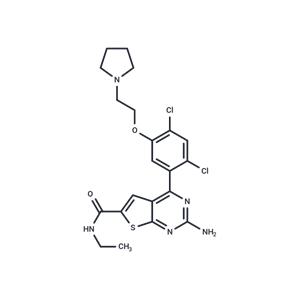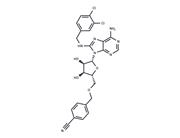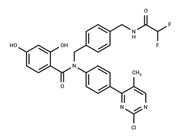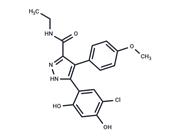| Name | VER-82576 |
| Description | VER-82576 (NVP-BEP800), a synthetic HSP90β inhibitor (IC50: 58 nM), exhibits >70-fold selectivity against Hsp90 family members Trap-1 and Grp94. |
| Cell Research | Cells are exposed to NVP-BEP800 for 24 hours. Cell proliferation is determined using either sulforhodamine B for adherent cells or MTS assay for suspension cells or those showing low adherence. Cell death is determined using a ToxiLight nondestructive cytotoxicity bioassay kit. Cell cycle progression is determined by RNase A/propidium iodide staining following fixation in 70% ethanol. Caspase-3/7 activity is determined using a homogeneous caspase activity kit.(Only for Reference) |
| Kinase Assay | Competitive binding fluorescent polarization assay: Recombinant Hsp90β, TAMRA-radicicol, or various concentrations of NVP-BEP800 is added in assay buffer (50 mM TRIS pH 7.4, 5 mM MgCl2, 150 mM KCl, and 0.1% CHAPS), mixed, and incubated at room temperature for 30 to 45 minutes prior to reading. The 2D-FIDA-based HTS assay based on confocal technologies monitors the decreased fluorescence polarization on displacement of the high affinity ligand TAMRA-radicicol from Hsp90β by NVP-BEP800. The concentration of NVP-BEP800 which inhibits Hsp90β by 50% is determined from the competition curve. |
| In vitro | In the A375 malignant melanoma transplantation tumor model, NVP-BEP800 (15 or 30 mg/kg/day, p.o.) treatment for 15 days dose-dependently decreased the levels of B-Raf and Akt phosphorylation and showed anticancer activity, with T/C values of 53% and 6% with NVP-BEP800 (15 and 30 mg/kg/day) treatment and almost total tumor inhibition with 30 mg/kg/day. 30 mg/kg inhibited almost all tumors. In BT-474 breast cancer transplantation tumors, NVP-BEP800 treatment increased the dissociation of Hsp90-p23 complex and decreased the levels of stable ErbB2, p-Akt and p-S6 in a dose-dependent manner, and NVP-BEP800 (30 mg/kg/day) treatment resulted in 38% tumor regression. Treatment with 15 mg/kg/day resulted in a T/C of 36%. |
| In vivo | NVP-BEP800 effectively inhibited the proliferation of various tumor cell lines including A375 cells (GI50: 38 nM) and PC3 cells (GI50: 1.05 μM). In A2058 and A549 cells, NVP-BEP800 (5-fold of GI50) increased the G2-M phase percentage. In BT-474 cells, NVP-BEP800 induced Akt and ErbB2 dephosphorylation, ErbB2 degradation, and Hsp70 induction in a concentration-dependent manner (IC50: 218/39.5/137/207 nM).At a concentration of 10 μM of Hsp70, the effects of NVP-BEP800 on the closely related GHKL ATPase, topoisomerase II, and structurally unrelated ATPases were observed. II and structurally unrelated ATPases were not significantly inhibited. |
| Storage | Powder: -20°C for 3 years | In solvent: -80°C for 1 year | Shipping with blue ice. |
| Solubility Information | DMSO : 1 mg/mL
|
| Keywords | HSP | NVP-BEP 800 | Heat shock proteins | VER 82576 | NVP-BEP-800 | VER82576 | VER-82576 | Inhibitor | inhibit |
| Inhibitors Related | Ethoxyquin | SNX0723 | Tamoxifen | DN401 | SNX2112 | Ganetespib | Teprenone | Elesclomol | Rifabutin | Palmitic acid | Paeoniflorin | Tamoxifen Citrate |
| Related Compound Libraries | Target-Focused Phenotypic Screening Library | Bioactive Compound Library | Hematonosis Compound Library | Anti-Breast Cancer Compound Library | Inhibitor Library | NO PAINS Compound Library | Bioactive Compounds Library Max | Anti-Metabolism Disease Compound Library | Anti-Cancer Compound Library | Anti-Cancer Active Compound Library |

 United States
United States



